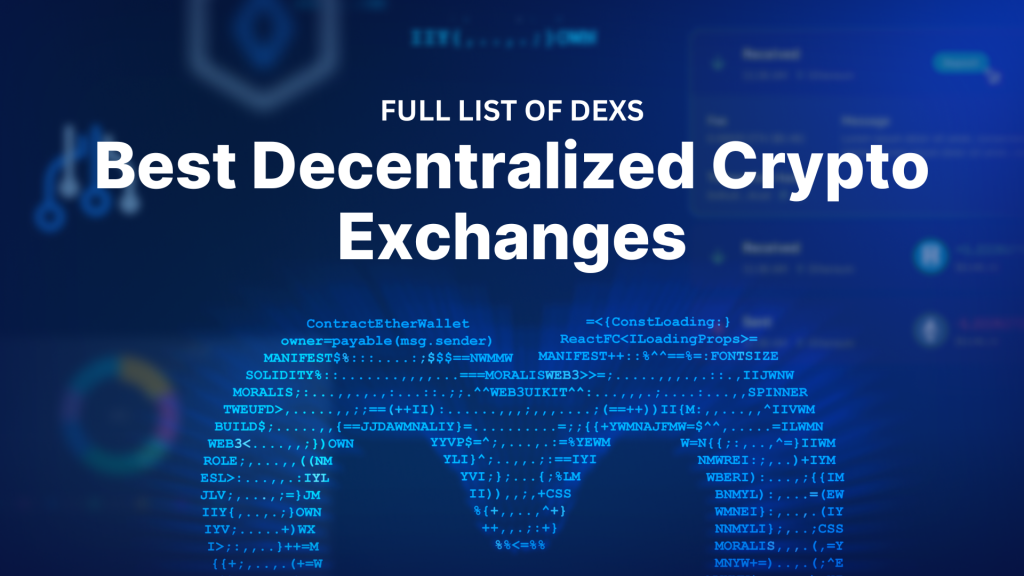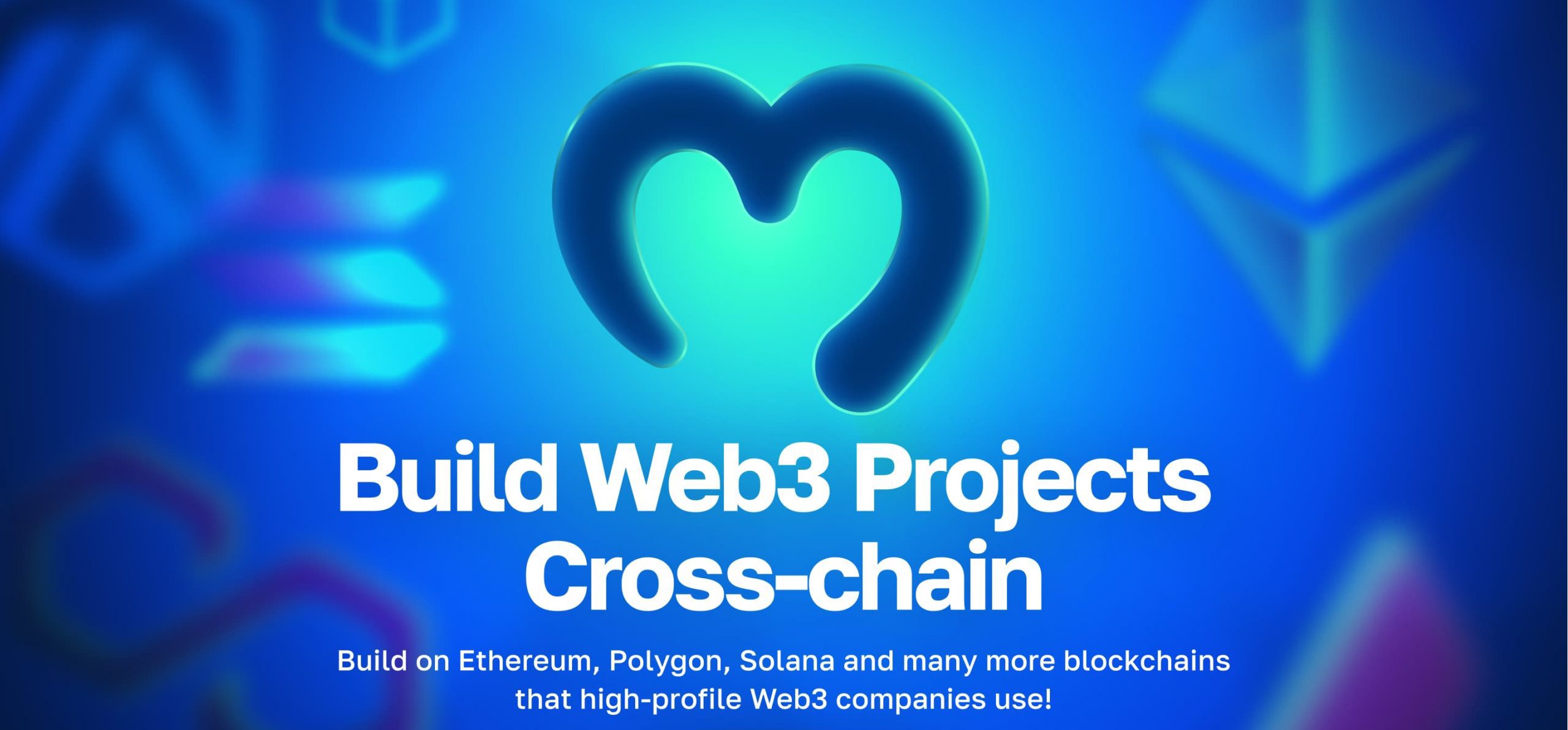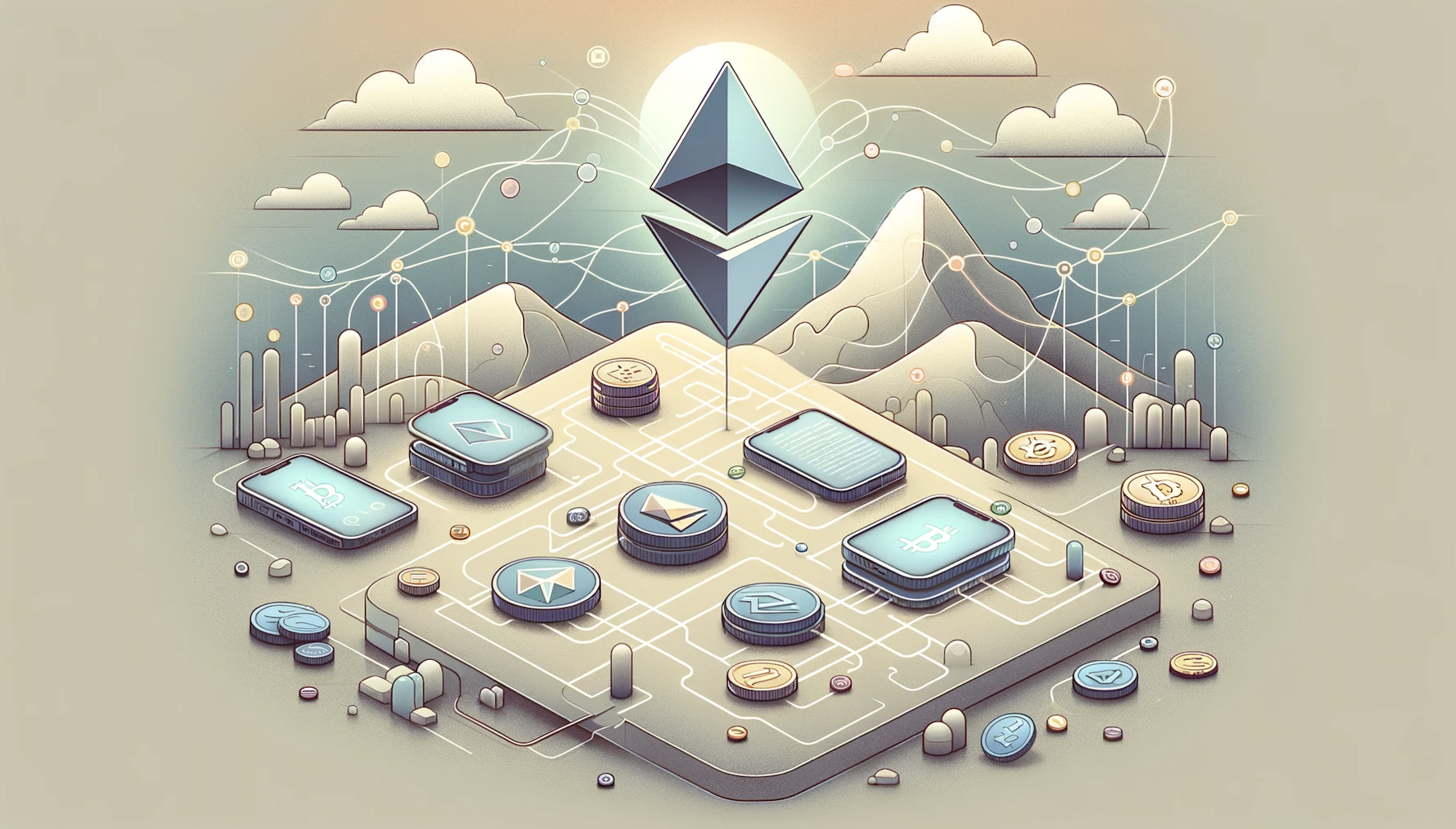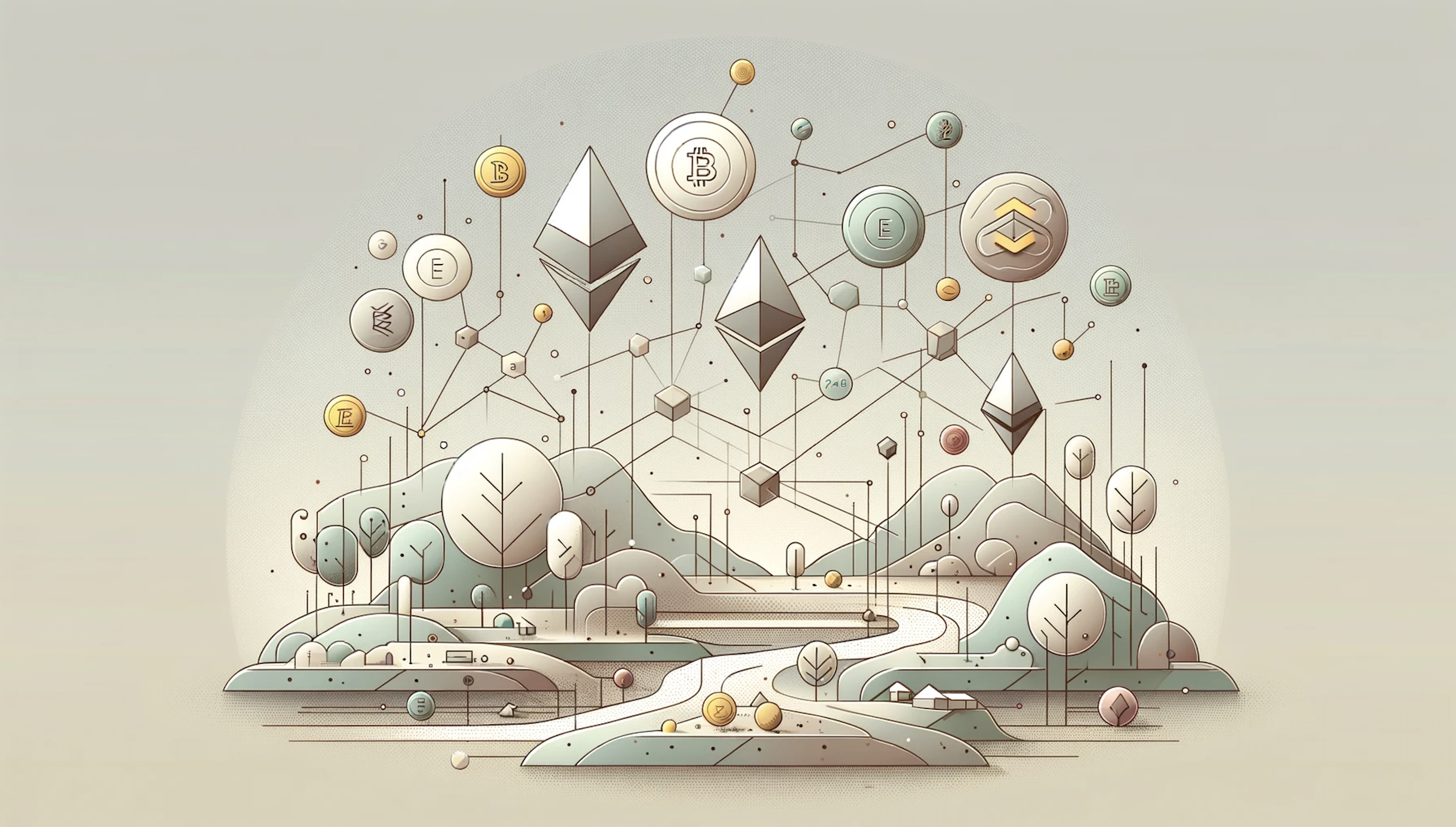[ad_1]

Decentralized exchanges (DEXs) are peer-to-peer marketplaces for trading digital assets such as BTC, ETH, BNB, SOL, etc. Hundreds of prominent DEXs are available, each with unique features and offerings, which can make it somewhat challenging to find the perfect platform for your needs. So, to help you navigate the space, we’ve created a list of DEX platforms currently making waves in the crypto industry, which we will examine further in this article. From Uniswap to PancakeSwap and Curve Finance to Orca, we’ll cover a full DEX list of the biggest exchanges on Ethereum, BNB Smart Chain, Polygon, Arbitrum, Avalanche, Fantom, and Solana!
List of DEXs Overview
We’ll kickstart today’s article by diving into the ins and outs of DEXs. In doing so, we’ll explain what they are, how they work, and cover some benefits of using these platforms. From there, we’ll jump into our full DEX list that covers prominent exchanges on the following blockchains: Ethereum, BNB Smart Chain, Polygon, Arbitrum, Avalanche, Fantom, and Solana. Next, we’re then going to expand on this list by diving a bit deeper into the industry’s biggest DEXs. Lastly, for those interested in building their own exchange, we’ll introduce you to Moralis – the industry’s premier Web3 API provider!
With Moralis’ cross-chain compatible Web3 APIs, you can effortlessly fetch and integrate on-chain data and Web3 functionality into your decentralized applications (dapps) with only a few lines of code. As such, when working with Moralis, it has never been easier to build blockchain-based projects.

So, if you want to supercharge your Web3 development endeavors, sign up with Moralis immediately, and you’ll be able to start leveraging the full power of blockchain technology today!
So, what is a DEX? Without further ado, let’s dive into the first section and answer that question!
What is a DEX?
Decentralized exchanges (DEXs) are peer-to-peer (P2P) marketplaces for trading cryptocurrencies like Bitcoin, ether, USDC, USDT, etc. Compared to centralized exchanges (CEXs) – which rely on a central authority to facilitate transactions – a DEX allows you to seamlessly trade cryptocurrencies in a non-custodial manner without intermediary involvement!

So, how does this work?
In the absence of intermediaries and central authorities, DEXs leverage decentralized technologies – such as blockchain networks and smart contracts – to facilitate trades directly between users.
Smart contracts are essentially self-executing programs stored on blockchain networks like Ethereum, Polygon, Abitrum, etc. These contracts are programmed to run whenever some predetermined conditions are met, making them ideal for automating trades, transactions, and other operations.
All in all, DEXs are P2P marketplaces that allow you to trade cryptocurrencies effortlessly without intermediary involvement!
With a brief overview of what DEXs are and how they work, let’s now explore the benefits of these platforms compared to CEXs!
Benefits of DEXs
DEXs have many benefits, and in this section, we’ll explore five prominent examples:
- Improved Security: Since DEXs are non-custodial, you never have to relinquish control of your private keys when using these platforms. This minimizes the risks of sensitive information getting into the hands of hackers and other bad-faith actors.
- Low Fees: By leveraging smart contracts, DEXs remove the need for intermediary involvement. In return, these platforms can feature lower fees, as no additional actors charge extra for their services.
- Trustless Transactions: On CEXs, all transactions are overseen and executed by a central authority you need to trust. DEXs, on the other hand, execute trades via smart contracts and record them on the blockchain, facilitating trustless transactions.
- Privacy: Unlike most CEXs, DEXs don’t require you to disclose personal information when trading.
- Token Diversity: There are thousands and thousands of cryptocurrencies on the market, and CEXs exercise control over the tokens they list. As such, many altcoins are only accessible through DEXs.

Now that you have familiarized yourself with the ins and outs of these platforms, let’s dive straight into our full list of DEXs in the next section!
Full List of DEXs
There are many prominent DEXs available across multiple networks, and in this section, we’ll explore a list of platforms categorized by chain. More specifically, we’ll look at popular DEXs for the following seven networks:
- Ethereum
- BNB Smart Chain (BSC)
- Polygon
- Arbitrum
- Avalanche
- Fantom
- Solana
Due to the vast number of DEXs, we can only cover some of them in this guide. As such, if you’d like to explore additional platforms and chains we don’t get into below, feel free to check out a complete list of decentralized exchanges on Moralis’ Web3 Wiki!
Now, let’s dive into our Ethereum DEX list!
Ethereum DEX List
Here’s an Ethereum DEX list featuring three of the chain’s most established platforms:
| Ethereum DEX List | |
| Name | Description |
| 1. Uniswap | Uniswap is not only Ethereum’s but the industry’s leading automated market maker (AMM) for swapping cryptocurrency tokens. |
| 2. Curve Finance | Curve Finance is an AMM focusing on stablecoins like DAI, USDC, USDT, etc. |
| 3. DODO | DODO is a popular DEX using a proactive market maker (PMM) algorithm to provide improved liquidity and price stability. |
BSC DEX List
This is a BSC DEX list covering three of the ecosystem’s most prominent exchanges:
| BSC DEX List | |
| Name | Description |
| 1. PancakeSwap | PancakeSwap is a vast and well-known AMM on BNB Smart Chain (BSC) that allows users to swap BEP-20 tokens. |
| 2. Uniswap | The Uniswap protocol has also been deployed to BSC, and it’s one of the ecosystem’s most prominent AMMs. |
| 3. THENA | THENA is a native liquidity layer and well-established AMM-based DEX on BSC. |
Polygon DEX List
Here’s our Polygon DEX list featuring three of the blockchain’s most well-established platforms:
| Polygon DEX List | |
| Name | Description |
| 1. Uniswap | Uniswap is additionally available on Polygon, standing out as one of the chain’s leading DEXs. |
| 2. QuickSwap | QuickSwap is a prominent AMM-based DEX on the Polygon network, allowing users to swap, farm, and stake tokens at fast speeds and with low fees. |
| 3. Retro | Retro is an AMM on the Polygon network, allowing users to trade crypto with low slippage and minimal gas fees. |
Arbitrum DEX List
This is our Arbitrum DEX list featuring three of the chain’s most prominent protocols:
| Arbitrum DEX List | |
| Name | Description |
| 1. Uniswap | Uniswap has also been deployed to Arbitrum, and it’s one of the ecosystem’s most established AMMs. |
| 2. Camelot | Camelot is an AMM based on the Arbitrum network that takes a community-driven approach and focuses on composability. |
| 3. Vertex Protocol | Vertex Protocol is a DEX built on Arbitrum to support perpetual, spot, and money markets with cross-margin accounts. |
Avalanche DEX List
Here’s an Avalanche DEX list that includes three of the ecosystem’s most well-established exchanges:
| Avalanche DEX List | |
| Name | Description |
| 1. Trader Joe | Trader Joe is a leading AMM on the Avalanche blockchain, offering additional services like yield farming, staking, and more. |
| 2. WOOFI | WOOFI is a cross-chain DEX that operates on the Avalanche network, allowing users to swap, stake, and earn crypto. |
| 3. Uniswap | Uniswap is additionally available on Avalanche, facilitating seamless P2P transactions on the blockchain. |
Fantom DEX List
This is a Fantom DEX list with three prominent exchanges:
| Fantom DEX List | |
| Name | Description |
| 1. WigoSwap | WigoSwap is an essential component of the Wigo ecosystem, and it’s one of the biggest AMMs on the Fantom blockchain. |
| 2. Equalizer | Equalizer is a perpetual DEX on the Fantom blockchain, allowing users to swap tokens effortlessly. |
| 3. SpookySwap | SpookySwap is a leading AMM on Fantom, leveraging the low fees of the network to create a seamless trading experience. |
Solana DEX List
Here’s a Solana DEX list featuring three of the ecosystem’s most prominent platforms:
| Solana DEX List | |
| Name | Description |
| 1. Orca | Orca swap is the biggest AAM-based DEX built on Solana, and the platform provides an intuitive user interface to facilitate seamless P2P transactions on the network. |
| 2. Raydium | Raydium is a prominent AMM on Solana, enabling users to swap tokens and provide liquidity and farm rewards. |
| 3. Lifinity | Lifinity is a Solana-based DEX powered by a swap aggregation engine and PMM algorithm. |
Exploring the Biggest DEXs On the List
The previous section covered our complete DEX list, and as you noticed, it featured prominent platforms on Ethereum, BSC, Polygon, Arbitrum, Avalanche, Fantom, and Solana. In this section, we’ll briefly expand on this list by diving a bit deeper into the industry’s overall leading DEXs, starting with Uniswap!
- Uniswap: Uniswap launched in 2018 and is currently the biggest AMM-based DEX on the market by trading volume. Also, if you have followed along in our DEX list, you already know that the protocol has been deployed to multiple networks, including Ethereum, BSC, Polygon, Avalanche, Arbitrum, Optimism, and others.
- Orca: Orca launched in 2021, and it’s the most significant AMM-based DEX on the Solana blockchain. The platform features an intuitive interface, offering a user-friendly place to swap cryptocurrencies on the network. What’s more, Orca leverages the advantages of the Solana blockchain to facilitate quick transactions with low fees.
- Curve Finance: Curve Finance launched in 2020, and it’s, much like Uniswap, a protocol available on multiple blockchains, including Ethereum, Polygon, Fantom, Optimism, and others. Furthermore, this AMM has many similarities to Uniswap, but it differentiates itself by focusing on accommodating liquidity pools for assets like stablecoins, including DAI, USDC, USDT, etc.

That gives you an overview of the industry’s biggest DEXs. In the following section, we’ll now introduce you to cryptocurrency exchange development!
Beyond Our List of DEXs: How to Build Your Own DEX
If you want to build your own DEX similar to Uniswap, Orca, or Curve Finance, you’ll definitely want to leverage Moralis in your development endeavors!
But what exactly is Moralis?
Moralis is the industry’s leading Web3 API provider, giving you the tools you need to build sophisticated blockchain-based projects. With our cross-chain compatible APIs, you can seamlessly fetch and integrate on-chain data and Web3 functionality into your dapps without breaking a sweat!

To showcase the power and accessibility of Moralis, here are three examples of prominent Web3 APIs you’ll likely find helpful when building a DEX:
- Wallet API: Moralis’ Wallet API is the ultimate tool for integrating Web3 wallet functionality into your dapps. With only single lines of code, you can effortlessly fetch native balances, NFTs, transactions, and more from any address. For instance, this is how easy it is to get the native balance of a wallet using the
getNativeBalance()endpoint:
const response = await Moralis.EvmApi.balance.getNativeBalance({ "chain": "0x1", "address": "0xDC24316b9AE028F1497c275EB9192a3Ea0f67022" }); - Price API: The Price API is the industry’s most complete interface for prices, covering everything from the smallest and newest coins to the most significant cryptocurrencies. For example, you can effortlessly use the
getTokenPrice()endpoint to get the price of any token:
const response = await Moralis.EvmApi.token.getTokenPrice({ "chain": "0x1", "address": "0x7d1afa7b718fb893db30a3abc0cfc608aacfebb0" }); - Token API: Moralis’ Token API is the ultimate tool for ERC-20 token data, allowing you to seamlessly get the metadata, balance, transactions, etc., of any token. For instance, here’s the
getTokenMetadata()endpoint in action:
const response = await Moralis.EvmApi.token.getTokenMetadata({ "chain": "0x1", "addresses": [ "0xdAC17F958D2ee523a2206206994597C13D831ec7" ] }); To learn more about all our interfaces, check out our Web3 API page!
For a full tutorial on how to use our APIs to build a DEX, check out the video below:
Also, did you know you can access all our Web3 APIs for free? So, if you haven’t already, make sure to sign up with Moralis straight away!
Summary: Full List of DEXs
We started today’s article by diving into the ins and outs of DEXs. In doing so, we discovered that they are P2P marketplaces for trading cryptocurrency tokens. From there, we then jumped straight into a DEX list covering the most prominent exchanges on the following networks: Ethereum, BSC, Polygon, Arbitrum, Avalanche, Fantom, and Solana! Next, we also explored three of the biggest exchanges further, where we covered the following three platforms:
Lastly, to top things off, we introduced you to Moralis and showed you how to build your own DEX using our industry-leading Web3 APIs!

If you liked this article providing a list of DEXs, consider checking out more of our content here on the Moralis blog. For instance, explore the best crypto portfolio tracker or take a look at our Web3 games list.
Also, if you want to build your own DEX, remember to sign up with Moralis. You can create an account for free, and you’ll be able to start leveraging all our Web3 APIs immediately!
[ad_2]
Read More: moralis.io








 Bitcoin
Bitcoin  Ethereum
Ethereum  Tether
Tether  XRP
XRP  Solana
Solana  USDC
USDC  TRON
TRON  Dogecoin
Dogecoin  Lido Staked Ether
Lido Staked Ether  Cardano
Cardano  Wrapped Bitcoin
Wrapped Bitcoin  Hyperliquid
Hyperliquid  Wrapped stETH
Wrapped stETH  Sui
Sui  Bitcoin Cash
Bitcoin Cash  Chainlink
Chainlink  LEO Token
LEO Token  Stellar
Stellar  Avalanche
Avalanche  Toncoin
Toncoin  WhiteBIT Coin
WhiteBIT Coin  USDS
USDS  Shiba Inu
Shiba Inu  WETH
WETH  Wrapped eETH
Wrapped eETH  Litecoin
Litecoin  Binance Bridged USDT (BNB Smart Chain)
Binance Bridged USDT (BNB Smart Chain)  Hedera
Hedera  Monero
Monero  Ethena USDe
Ethena USDe  Polkadot
Polkadot  Bitget Token
Bitget Token  Coinbase Wrapped BTC
Coinbase Wrapped BTC  Uniswap
Uniswap  Pepe
Pepe  Pi Network
Pi Network  Aave
Aave  Dai
Dai  Ethena Staked USDe
Ethena Staked USDe  OKB
OKB  Bittensor
Bittensor  BlackRock USD Institutional Digital Liquidity Fund
BlackRock USD Institutional Digital Liquidity Fund  Aptos
Aptos  Cronos
Cronos  Internet Computer
Internet Computer  NEAR Protocol
NEAR Protocol  Jito Staked SOL
Jito Staked SOL  sUSDS
sUSDS  Ethereum Classic
Ethereum Classic